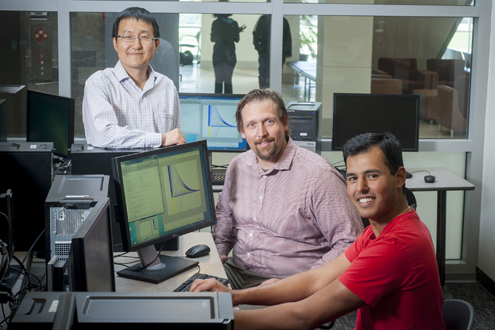MathWorks Funds New nanoHUB Course

Nan Kong, associate professor of biomedical engineering, David Umulis, associate professor of biomedical engineering and agricultural and biological engineering, and undergraduate student Sean Thandupurkal.
"This course gives us a unique opportunity to demonstrate the quality and innovation of Weldon School curricula and research to thousands of students worldwide who are interested in a biomedicine-focused STEM education, but who may not have the privilege to physically enroll in a world-class university like Purdue,” said Nan Kong, an associate professor of biomedical engineering at the Weldon School. Kong is developing the course with David Umulis, an associate professor of biomedical engineering and agricultural and biological engineering at Purdue.
The course, entitled “Computational Modeling in Biology, Medicine, and Healthcare,” is a problem-solving based course that will enhance students’ training in computational modeling and analysis related to engineering tasks and model-based reasoning. Three teaching modules will emphasize statistical data analysis, model calibration, and system optimization and their application in biomedical and healthcare engineering problems. A final module will use all the three building blocks to solve an open-ended project. The course will cover critical biomedical and healthcare engineering topics, including biotransport and signaling, cancer progression, and infectious disease transmission.
The nanoHUB course will give rise to a new undergraduate course offered at Purdue’s residential campus with lectures that frame the streamlined teaching modules from the nanoHUB course. The course is expected to be offered in spring 2015 and will provide residential students with an additional opportunity to gain experience in mathematical modeling of complex processes and systems in biology, medicine, and healthcare than what is currently offered on campus.
Several peer institutions, both domestically and abroad, are expected to collaborate with the project team in adopting the nanoHUB course developed at the Weldon School for their own universities.
“As we progress through the course, we will be assessing student outcomes and adjusting the course design as needed,” said Umulis. “We expect to develop new and effective ways of connecting and communicating with students, both online and on campus. We also hope to connect with other experts in the field and expand our global network, potentially opening up even more possibilities for collaboration in the future.”
This is the first nanoHUB course offered by Weldon School faculty members that was funded by MathWorks, the leading developer of mathematical computing software for engineers and scientists.

